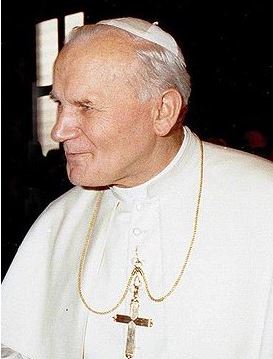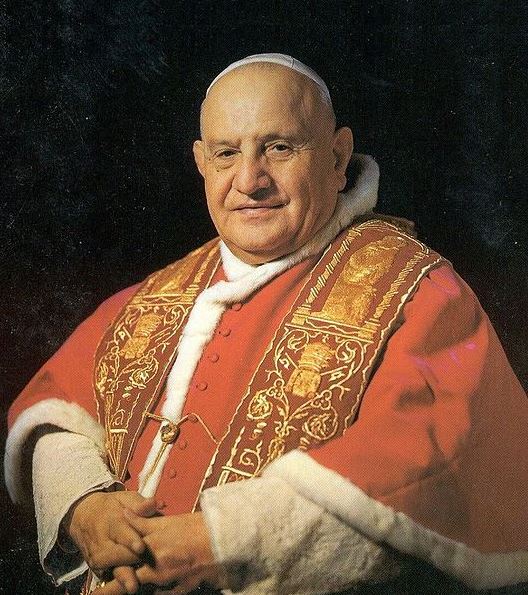The secret of what makes the two popes saints
Speaking this week at a Vatican press briefing entitled ‘Why Pope John XXIII and Pope John Paul II are saints’, Fr Giovangiuseppe Califano, the current postulator for John XXIII’s canonisation – the fourth since 1966 – said that the heart of John’s papal ministry lay in his identification as a pastor and a father. Indeed, meeting with representatives of John XXIII’s home diocese of Bergamo on 3 June last, Pope Francis observed that the whole world had recognised in John XXIII a true shepherd and father.
Fr Califano explained that John XXIII’s diary, published as Journal of a Soul, shows how in his first year as a seminarian he was directed towards sainthood through unity with Jesus, regular prayer of the Rosary, and constant vigilance over his own actions. He succeeded in this through his years as student, priest, bishop, and pope. He never forgot how God calls each one of us to sanctity. When he was 21 he wrote, “God desires truly that I should be a saint, and therefore I should be a saint”, and many decades later as Pope he wrote, “They call me the holy father. I should be so: holy.”
John XXIII saw his episcopal model as being one of obedience and peace, and defined his own life in these terms. He had to face the challenge of obedience many times in his life, and as nuncio was often called upon to uproot himself and move to face new realities, new lands without familiar Catholic faces. He was able to do this through his absolute trust in God. Pope Francis has described such obedience as the action of the Holy Spirit, leading us into a life of holiness.
When we think of John XXIII, Fr Califano went on, the images that are evoked are those of humility, generosity, and authentic joy. He cited his 1958 visit to Rome’s Bambino Gesù children’s hospital, which started a tradition that continues to this day, his visits to obscure parishes on the periphery of Rome, and his determination to ‘open the windows of the Church’ through convening the Second Vatican Council.
It is hardly surprising that more than 50 years after his death people remain devoted to the memory of Pope John and continue to ask for his prayers; as his successor, Paul VI, observed, ‘John XXIII’ was a synonym for the word ‘love’.

Following Fr Califano, Mgr Slavomir Oder, postulator for the case of Pope John Paul II, said that John Paul II had been formed by prayer, an incredible capacity for self-reflection, and above all a life of suffering.
He lost his mother at an early age, followed by his older brother and eventually his father; he had to face incredible suffering as a young man who was completely alone. Nonetheless, said Mgr Oder, this young man decided to face the mystery of life. He did not run away from it, but entered into its drama, holding that we should live our lives such that they would be expressions of God’s glory.
Pope John Paul II always said that his father taught him how to pray, and that his home was his first seminary; like John XXIII, he was formed by a simple, popular faith.
John Paul II’s second mentor was a layman called Jan Tyranowski through whom John Paul discovered the true meaning of the laity as later presented by the Second Vatican Council. He served as a reference point through John Paul’s youth, helped him as he discerned his path to priesthood, and encouraged in him the development of a Marian and Carmelite spirituality, heavily influenced by the writings of the Carmelite mystic St John of the Cross.
The development of John Paul’s spiritual life can therefore be traced through the guidance of his father, Jan Tyranowski, and finally Stefan Sapieha, the archbishop of Krakow in whose underground seminary John Paul trained as a priest during the Nazi occupation of Poland. Together they helped foster his simplicity, his mysticism, and his courage.
In Krakow Archbishop Karol Woytla spoke of living within a Eucharistic space, and from there governing the Church. John Paul II to the end lived in this space right to the end, noted Mgr Oder, alluding to how Pope emeritus Benedict had described the last Mass by the bedside of his dying predecessor.
John Paul’s desire to be close to people revealed the essence of his spirituality; this was not something manufactured when he became pope but was integral to him through his whole life. Deep connections with the lives of people of faith nurtured who he was, and being close to people kept him in tune with the heart of the Church, enabling him to share the Gospel, thus helping to bring others to holiness. He lived to bring the Good News into people’s lives, so that they in turn could become holy.
Although John Paul lived through the Nazi occupation of Poland and decades of Communist oppression, it was not merely his strength and tenacity that enabled him to survive. He persisted in his devotion to God’s divine mercy, which recognised our common equality. This devotion to God’s mercy had been dear to him since Cardinal Sapieha had introduced him to the writings of Sr Faustina Kowalska, the visionary nun who died in Krakow in 1938 and whom John Paul II canonised in 2000, officially designating the first Sunday after Easter to be celebrated as the feast of Divine Mercy.
John Paul’s holiness, explained Monsignor Oder, was marked by a profound sense of gift; he knew his life was a gift from God, and believed that each step in the path of his life had been paved by the love and suffering of others. Having been so blessed, it was his duty to live his life in love; so lived, it became an expression of God’s glory.
[Post by Greg Daly]

















